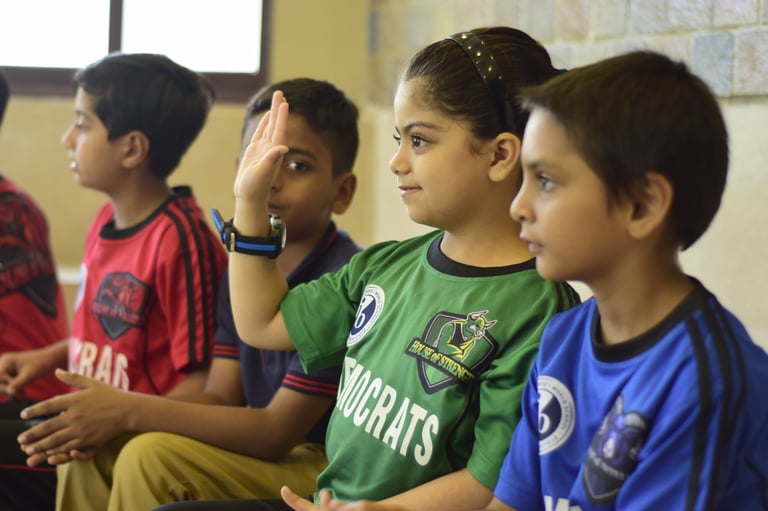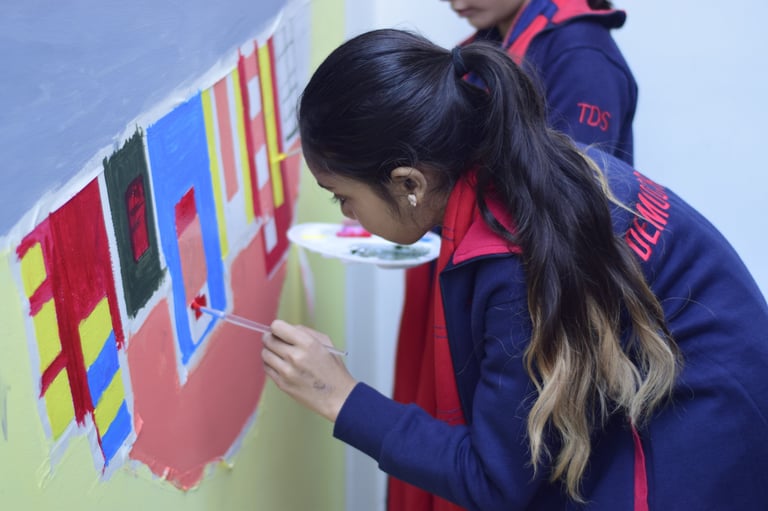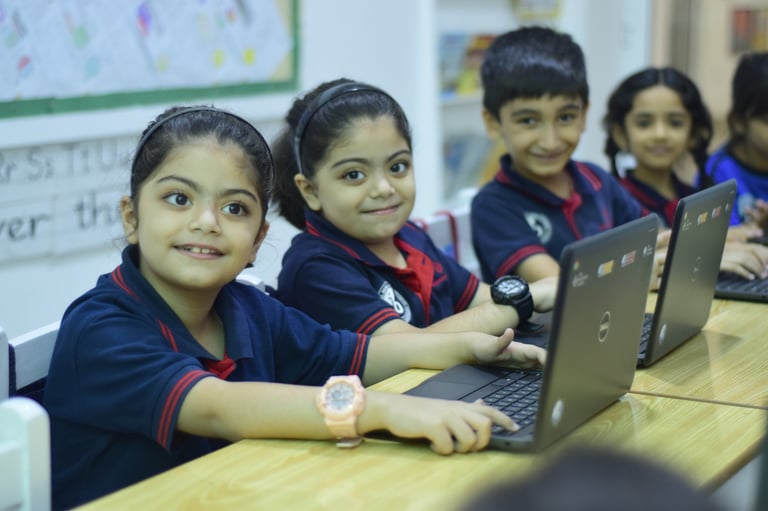
Discover the Power of an
IB Education
All About IB Education
The Democratic school is authorized as an IB World School. These are schools that share a common philosophy—a commitment to high-quality, challenging, international education that The Democratic School believes is important for our students.
Only schools authorized by the IB Organization can offer any of its four academic programs: the Primary Years Programme (PYP), the Middle Years Programme (MYP), the Diploma Programme, or the Career-related Programme (CP). Candidate status gives no guarantee that authorization will be granted. For further information about the IB and its programs, visit www.ibo.org
All About IB
Explore the benefits and details of the International Baccalaureate programs for schools.
What is an IB Education?


An International Baccalaureate (IB) education nurtures inquiring, knowledgeable, and compassionate learners. It emphasizes intercultural understanding, critical thinking, and preparing students for success in a globalized world.




IB-Mission
The IB mission is to develop inquiring, knowledgeable, and caring young people who strive to create a better, more peaceful world through intercultural understanding and respect. It fosters active, compassionate learners and promotes lifelong learning.
International mindedness in IB education encourages students to appreciate their own cultures while respecting and understanding others. It fosters a global perspective, promoting empathy and collaboration across diverse communities.
International Mindedness
What is an IB Education?
Imagine a worldwide community of schools, educators, and students with a shared vision and mission to empower young people with the skills, values, and knowledge to create a better and more peaceful world.
This is the International Baccalaureate (IB).
In 1968 the first Programme offered by the IB, the Diploma Programme, was established. It sought to provide a challenging yet balanced education that would facilitate geographic and cultural mobility by providing an internationally recognized university entrance qualification that would also serve the deeper purpose of promoting intercultural understanding and respect.
With the introduction of the Middle Years Programme in 1994 and the Primary Years Programme in 1997, the IB identified a continuum of international education for students aged 3 to 19. The introduction of the IB
Career-related Programme in 2012 enriched this continuum by providing a choice of international education pathways for 16 to 19-year-old students.
Each of the IB programs reflects a central desire to provide an education that enables students to make sense of the complexities of the world around them, as well as equipping them with the skills and dispositions needed for taking responsible action for the future. They provide an education that crosses
disciplinary, cultural, national, and geographical boundaries and that champions critical engagement, stimulating ideas, and effective relationships.
The International Baccalaureate aims to develop inquiring, knowledgeable, and caring young people who help to create a better and more peaceful world through intercultural understanding and respect. To this end, the organisation works with schools, governments, and international organisations to develop challenging programs of international education and rigorous assessment. These programs encourage students across the world to become active, compassionate, and lifelong learners who understand that other people, with their differences, can also be right.
IB-Mission
The International Baccalaureate® (IB) offers a continuum of international education through four challenging, high quality educational programmes to students aged 3 to 19.
Programmes
Our programmes encourage both personal development and academic achievement challenging students to think critically, to ask the right questions and think across disciplines. An IB education also fosters diversity, curiosity and a healthy appetite for learning.
Schools must be authorized to teach our IB programmes. Every school authorized to offer IB programmes is known as an IB World School.
Read about the IB programmes




Primary Years Programme
Middle Years Programme
The PYP marks the start of a lifelong journey. It develops caring and culturally aware children aged 3 – 12 to become active participants in their own learning.
Age range: 3-12
Building a solid academic foundation, the MYP develops students’ confidence in managing their own learning and making connections between their learning in the classroom and the real world.
Age range: 11-16
International Mindednes
All IB programs aim to develop internationally minded people who recognize their common humanity and shared guardianship of the planet. Central to this aim is international-mindedness.International-mindedness is a multi-faceted and complex concept that captures a way of thinking, being and acting that is characterized by an openness to the world and a recognition of our deep interconnectedness to others.
To be open to the world, we need to understand it. IB programs, therefore, provide students with opportunities for sustained inquiry into a range of local and global issues and ideas. This willingness to see beyond immediate situations and boundaries is essential as globalization and emerging technologies continue to blur traditional distinctions between the local, national and international.An IB education fosters international-mindedness by helping students reflect on their perspectives, Culture, and identities, and then on those of others. By learning to appreciate different beliefs, values, and experiences, and to think and collaborate across cultures and disciplines, IB learners gain the understanding necessary to make progress toward a more peaceful and sustainable world.
An IB education further enhances the development of international-mindedness through multilingualism.All IB programs require the students to study or study in, more than one language because we believe that communicating in more than one language provides excellent opportunities to develop intercultural understanding and respect. It helps the students to appreciate that his or her language, culture, and worldview are just one of many.
International-mindedness is also encouraged through a focus on global engagement and meaningful service with the community. These elements challenge the student to critically consider power and privilege and to recognize that he or she holds this planet and its resources in trust for future generations.
They also highlight the focus on action in all IB programs: a focus on moving beyond awareness and understanding to engagement, action, and bringing about meaningful change. The components of an IB education described in this document work together to support the IB’s overarching aim of developing international-mindedness.
Knowledgeable
We develop and use conceptual understanding, exploring knowledge across a range of disciplines. We engage with issues and ideas that have local and global significance.
Thinkers
We use critical and creative thinking skills to analyze and take responsible action on complex problems. We exercise initiative in making reasoned, ethical decisions.
Inquiries
We nurture our curiosity, developing skills for inquiry and research. We know how to learn independently and with others. We learn with enthusiasm and sustain our love of learning throughout life
The IB learner profile places the student at the center of an IB education.The 10 attributes reflect the holistic nature of an IB education. They highlight the importance of nurturing dispositions such as curiosity and compassion as well as developing knowledge and skills. They also highlight that along with cognitive development, IB programs are concerned with students’ social, emotional, and physical well-being, and with ensuring that students learn to respect themselves, others, and the world around them.IB educators help students to develop these attributes throughout their IB education, and to demonstrate them in increasingly robust and sophisticated ways as they mature. The development of these attributes are the foundation of developing internationally-minded students who can help to build a better world.
The IB Learner Profile
We express ourselves confidently and creatively in more than one language and many ways. We collaborate effectively, listening carefully to the perspectives of other individuals and groups.
Communicators
We act with integrity and honesty, with a strong sense of fairness and justice, and with respect for the dignity and rights of people everywhere. We take responsibility for our actions and their consequences.
Principled
Open-minded
We critically appreciate our own cultures and personal histories, as well as the values and traditions of others. We seek and evaluate a range of points of view, and we are willing to grow from the experience
Caring
We show empathy, compassion, and respect. We have a commitment to service, and we act to make a positive difference in the lives of others and in the world around us.
Risk takers
We approach uncertainty with forethought and determination; we work independently and cooperatively to explore new ideas and innovative strategies. We are resourceful and resilient in the face of challenges and change.
Balanced
We use critical and creative thinking skills to analyze and take responsible action on complex problems. We exercise initiative in making reasoned, ethical decisions.
Reflective
We use critical and creative thinking skills to analyze and take responsible action on complex problems. We exercise initiative in making reasoned, ethical decisions.
